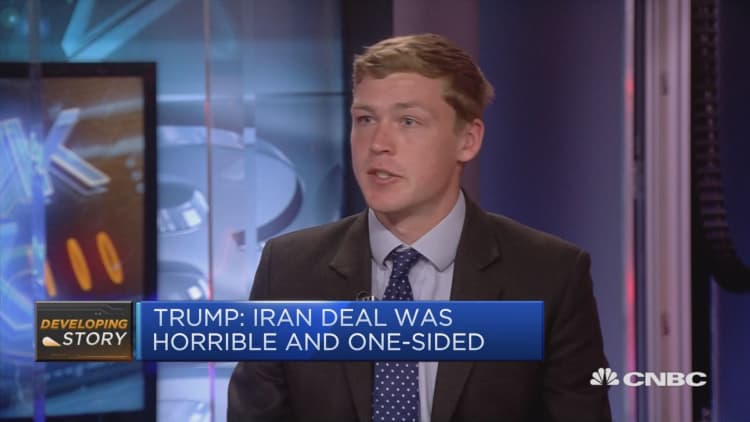
President Donald Trump's abandonment of the Iran nuclear deal may dramatically ratchet up military tensions in the Middle East, political analysts warned on Wednesday.
In a move that defied pleas from close allies, the U.S. president tore up the landmark nuclear accord and said he would seek to re-impose economic sanctions on Tehran. Iranian lawmakers responded to Trump's decision by setting fire to a U.S. flag and chanting "death to America" during a session of parliament.
"I think the problem here is that what Trump has done is he has empowered the hardliners in Iran," Nicholas Fitzroy, research analyst at the Economist Intelligence Unit, told CNBC's "Squawk Box Europe."
Fitzroy said the Trump administration's abandonment of the multi-party pact could prove to be the flashpoint for Iranian hardliners to adopt "a more confrontational approach" to a region already on edge.
"Our view is that southern Syria will see a new conflict breaking out between Iranian proxies and Israel," he added.
Missile strikes
Syria has long been engulfed in a chaotic war involving several parties fighting for their own calculated interests. One major geopolitical concern coming into sharp focus in recent months has been the escalation of clashes between Iran and Israel.
In the immediate aftermath of Trump's announcement Tuesday, an Iran-linked army base south of Syria's capital of Damascus was reportedly targeted by suspected Israeli missiles.
The alleged missile strikes came after Israel's military warned it was on high alert to protect itself from Iranian forces.
Israel was thought to have been preparing for retaliatory action from Tehran after an attack last month — presumed to have been carried out by Israel — hit an Iranian-controlled drone base deep in Syria. Britain's Syrian Observatory for Human Rights said up to 18 Iranians were killed in that attack, although Tehran has since denied there were any casualties.
'Regional war remains unlikely'
"Iran will likely turn up the temperature in regional hotspots against the U.S., Israel and Saudi Arabia, although a regional war remains unlikely," Cliff Kupchan, chairman of Eurasia Group, a Washington-based political consulting firm, said in a research note published Wednesday.
"The conflict with the highest potential for volatility is in Syria. As we expected, Israel has ratcheted up airstrikes against Iranian targets, seeking to thwart the establishment of Revolutionary Guard bases throughout Syria," he added.
Since 2013, Israel is estimated to have carried out more than 100 airstrikes in Syria, primarily targeting the Iranian-funded Lebanese militia group Hezbollah and military convoys. But the first months of 2018 have seen Israel broaden its intervention to increasingly target its longtime nemesis, Iran, directly.
So far, the conflict has not devolved into all-out war, something experts say both countries want to avoid.
But, Israel sees Iranian activity in Syria near its border as an existential threat, and aims to prevent Iranian military installations from becoming permanent bases from which Hezbollah can launch attacks into its territory. Israeli defense sources reportedly told U.S. officials in late April that any such attack would trigger a response targeting Iranian soil.
— CNBC's Natasha Turak contributed to this report.


